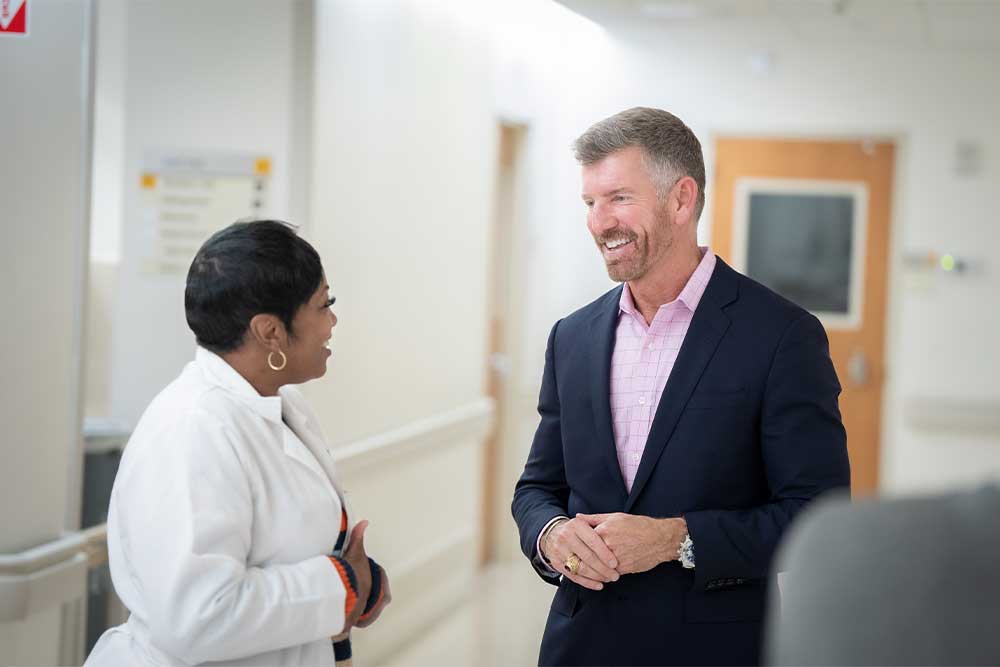
How Keck Medicine’s leadership development training is positively changing the culture of Keck Medicine of USC
Imagine this scenario:
A manager and a direct report meet about a pressing issue. The manager, all business, wants to quickly resolve the problem and move on, not giving the conversation the time it needs.
The staff member becomes overwhelmed and shuts down. Both walk away from the conversation feeling discouraged and defeated.
Now imagine if the manager had instead approached the situation with an attitude of openness and understanding.
The two would have had a more productive meeting, with the issue at least on its way to resolution, and with both individuals feeling more positive about the conversation.
This concept of leading with “curiosity, generosity and grace” is at the heart of a new leadership development effort we’ve launched at the medical center focused on Brené Brown’s Dare to Lead™ book. Through this effort, we explore exciting, productive topics that are not usually talked about at work.
We explore four areas of daring, courageous leadership skills, including the key trait of being vulnerable. What does vulnerability look like in a work environment, you may wonder. It might mean feeling more comfortable asking for help, admitting to yourself and others you’ve made a mistake or being more ready to acknowledge your own feelings and those of your co-workers. Once we open up to people without our metaphorical protective armor on — which in turn causes those we interact with to also “armor up” —we can progress to honest, productive conversations in an environment of respect and safety.
We also link leadership style to a person’s values — we ask our managers to look inward to discover what values drive them at work and how they show up every day ready to exemplify these core beliefs.
Other skill sets explored include how to nurture braveness when faced with a tough task, such as a difficult conversation with a colleague, and how to pick yourself up after a setback. Each of these tools are intended to assist our leaders in supporting caregiver needs and ensuring self and team accountability.
The need for leadership support grew out of the trauma of the pandemic, which left some health care workers understandably struggling with focus, prioritization and burn out. We see these leadership skills as a critical way to reengage and reenergize our staff. Our leadership team has held multiple listening sessions to understand our managers’ needs and concerns, and we continue to ask for feedback to make course corrections as necessary.
Seventy-five leaders are about to complete the inaugural training session, with a larger group of 120 starting a new session in October. After these sessions are completed, we are committed to continued skill-building and new leadership training.
The sessions are broken down into small groups, or what we call Daring Teams, in a co-learning environment led by members of the executive team. Our medical center executive leaders went through an intensive training experience to prepare for this collaborative curriculum.
Our Daring Teams content is a logical fit for Keck Medical Center of USC because the concepts are based on years of evidence-based research and reflect a trust-based approach to leadership used by our CEO, Rod Hanners.
So far, the response has been overwhelmingly positive. Karey Whitten, the director of ambulatory care operations at USC Norris Cancer Hospital, says: “This program has made me even more aware of approaching work through the lens of kindness and respect.”
She’s noticed a change in her colleagues as well. “We are caring for and supporting each other more than ever, just checking in to say, ‘hi, are you okay?’ This program helps us feel connected, that we are important, and that our colleagues and the organization cares about us,” she says.
I have also noticed a change in how people treat each other. Our culture is shifting beneath our feet as we begin to support similar bold concepts and help each other embrace a more evolved way of leading.
I am confident that this work will help leaders grow individually and in their roles at the medical center.
The more we all lean into our work with curiosity, generosity and grace, the stronger we’ll be, and so will our organization.
This program has made me even more aware of approaching work through the lens of kindness and respect.
Karey Whitten, the director of ambulatory care operations at USC Norris Cancer Hospital
Topics
